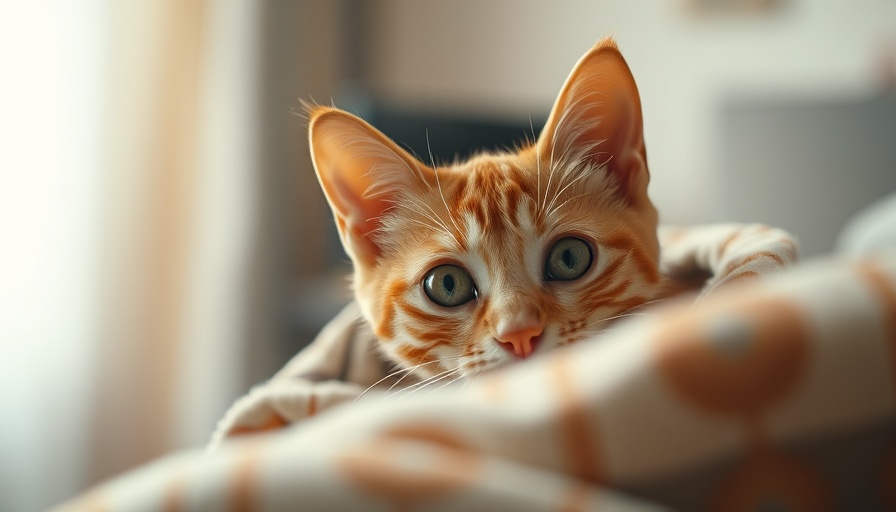
Understanding Cat Sneezing and Runny Nose
As a cat owner, witnessing your feline friend sneeze or have a runny nose can be concerning. Occasional sneezing may not indicate a serious health issue; however, persistent symptoms may signal an underlying health concern. Various factors contribute to these symptoms, including allergies, infections, and environmental irritants. In this guide, we will examine common causes of sneezing and nasal discharge in cats, explore treatments, and offer tips for preventing these issues.
Common Causes of Sneezing and Nasal Discharge
Understanding the underlying causes of sneezing and nasal discharge can help owners manage their cat's health effectively. Here are some prevalent reasons:
- Upper Respiratory Infections (URIs): A significant cause of sneezing in cats, infections caused by viruses like feline herpesvirus and calicivirus are common. Symptoms may also include fever and lethargy.
- Allergies: Cats can suffer from allergies due to pollen, dust, mold, or specific cleaning products. Seasonal changes may exacerbate symptoms, similar to seasonal allergies in humans.
- Foreign Objects: Sneezing may result from small particles or objects lodged in a cat’s nasal cavity, such as dust or grass.
- Fungal Infections: Some outdoor cats may contract fungal infections that lead to chronic sneezing and thick nasal discharge due to organisms like Cryptococcus.
- Dental Problems: Oral health is closely linked to respiratory health; dental infections can impact sinuses, leading to sneezing.
- Environmental Irritants: Exposure to irritants such as cigarette smoke or strong fragrances can trigger sneezing.
Symptoms to Monitor in Your Cat
When your cat is sneezing or has a runny nose, keep an eye out for additional symptoms that may require veterinary attention:
- Persistent sneezing
- Nasal discharge (clear, yellow, or green)
- Red or watery eyes
- Loss of appetite
- Difficulty breathing
- Pawing at the face
If symptoms persist for more than a couple of days or worsen, consulting a veterinarian is crucial to ensure your cat's well-being.
At-Home Remedies for Relief
While seeking veterinary advice is important, there are several home remedies that can help relieve your cat's discomfort:
- Steam Therapy: Creating a steam-filled environment can help loosen mucus. Consider running a hot shower and letting your cat sit in the bathroom for short periods.
- Saline Nasal Drops: Vet-recommended saline drops can help clear a cat's nasal passages, providing immediate relief.
- Humidifiers: Using a humidifier in your cat’s environment can keep nasal passages moist and comfortable.
- Cleaning Discharge: Gently wipe away any discharge from your cat’s nose and eyes using a soft cloth.
- Enhanced Hydration: Keeping your cat hydrated with fresh water and wet food can assist in their recovery.
- Quality Nutrition: A well-balanced diet supports your cat's immune system, helping them fend off infections.
When to Seek Professional Help
Chronic sneezing and nasal discharge may indicate conditions such as rhinitis or sinusitis, which require professional diagnosis and treatment. According to Dr. Kuehn from the Merck Veterinary Manual, chronic nasal inflammation often follows severe viral infections. Additional medical interventions might involve antibiotics if a secondary bacterial infection is suspected or antifungal medications for fungal-related issues.
Preventing Future Respiratory Issues
Proactive care can help mitigate future respiratory problems in your feline companion:
- Regular Vet Check-ups: Regular vet visits ensure early detection of potential health issues.
- Clean Environment: Maintain a clean living space to reduce allergens like dust and mold. Consider hypoallergenic home products.
- Dental Care: Regular tooth brushing and dental check-ups can prevent infections that affect respiratory health.
Identifying and treating sneezing and runny nose in cats is essential for maintaining their health and happiness. By understanding potential triggers, providing care at home, and seeking treatment when necessary, owners can help their furry friends feel better quickly. Prioritize regular check-ups with your veterinarian and stay vigilant in recognizing symptoms to ensure your pet's long-term well-being. Remember, your cat relies on you for their health and comfort!
Looking for more expert insights on cat care? Consult your veterinarian to address any specific concerns and ensure your cat receives the best possible care!
 Add Row
Add Row  Add
Add 


Write A Comment